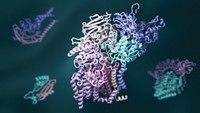Advertisement
Grab your lab coat. Let's get started
Welcome!
Welcome!
Create an account below to get 6 C&EN articles per month, receive newsletters and more - all free.
It seems this is your first time logging in online. Please enter the following information to continue.
As an ACS member you automatically get access to this site. All we need is few more details to create your reading experience.
Not you? Sign in with a different account.
Not you? Sign in with a different account.
ERROR 1
ERROR 1
ERROR 2
ERROR 2
ERROR 2
ERROR 2
ERROR 2
Password and Confirm password must match.
If you have an ACS member number, please enter it here so we can link this account to your membership. (optional)
ERROR 2
ACS values your privacy. By submitting your information, you are gaining access to C&EN and subscribing to our weekly newsletter. We use the information you provide to make your reading experience better, and we will never sell your data to third party members.
Proteomics
Study doubles number of experimentally detected proteins
Many of the detected proteins have unknown functions
by Celia Henry Arnaud
June 21, 2020
| A version of this story appeared in
Volume 98, Issue 24
Many proteins for which there is no experimental evidence have been predicted from the genomes of various species. Researchers have now doubled the number of experimentally detected proteins. Matthias Mann of the Max Planck Institute of Biochemistry and the University of Copenhagen and coworkers now report their proteomic analysis of 100 species, the largest cross-species comparative proteomics study to date (Nature 2020, DOI: 10.1038/s41586-020-2402-x). They analyzed the proteomes of 19 single-celled organisms known as archaea, 49 bacteria, and 32 eukaryotes, including many well-studied model organisms. In the whole set, they identified more than 2 million peptides and 349,164 proteins. About 93% of these peptides and proteins are ones found in TrEMBL, the portion of the UniProt protein database that includes sequences predicted from genomes but not experimentally detected. The researchers found previously undetected proteins even in extensively studied model organisms. Overall, more than 38% of the identified proteins have unknown biological functions. Among the 100 most abundant proteins for each species, nearly 23% have unknown functions. “These proteins may indicate essential but unique features in the evolutionary development of these organisms that may be of biological or biotechnological interest,” the researchers write.




Join the conversation
Contact the reporter
Submit a Letter to the Editor for publication
Engage with us on Twitter